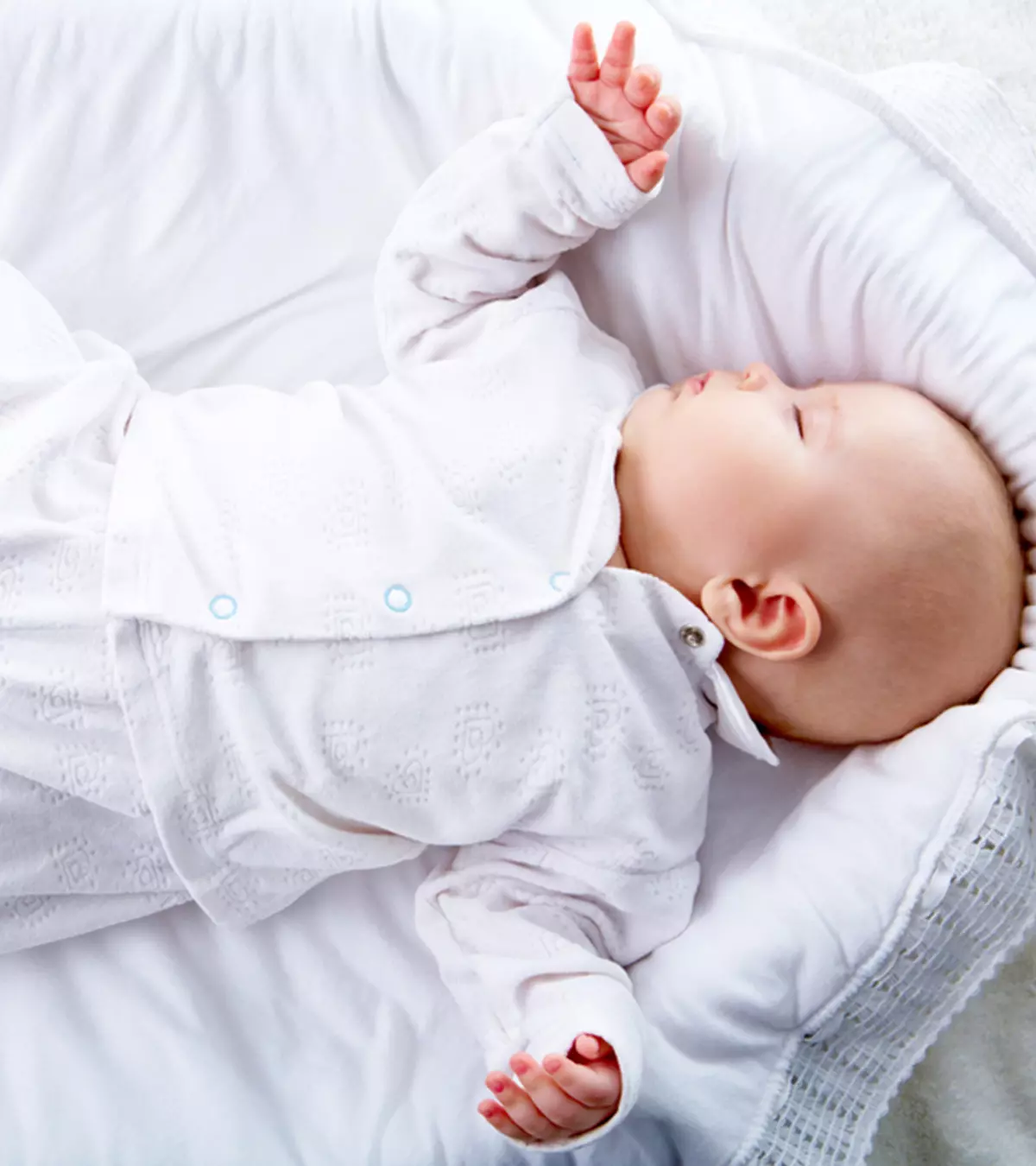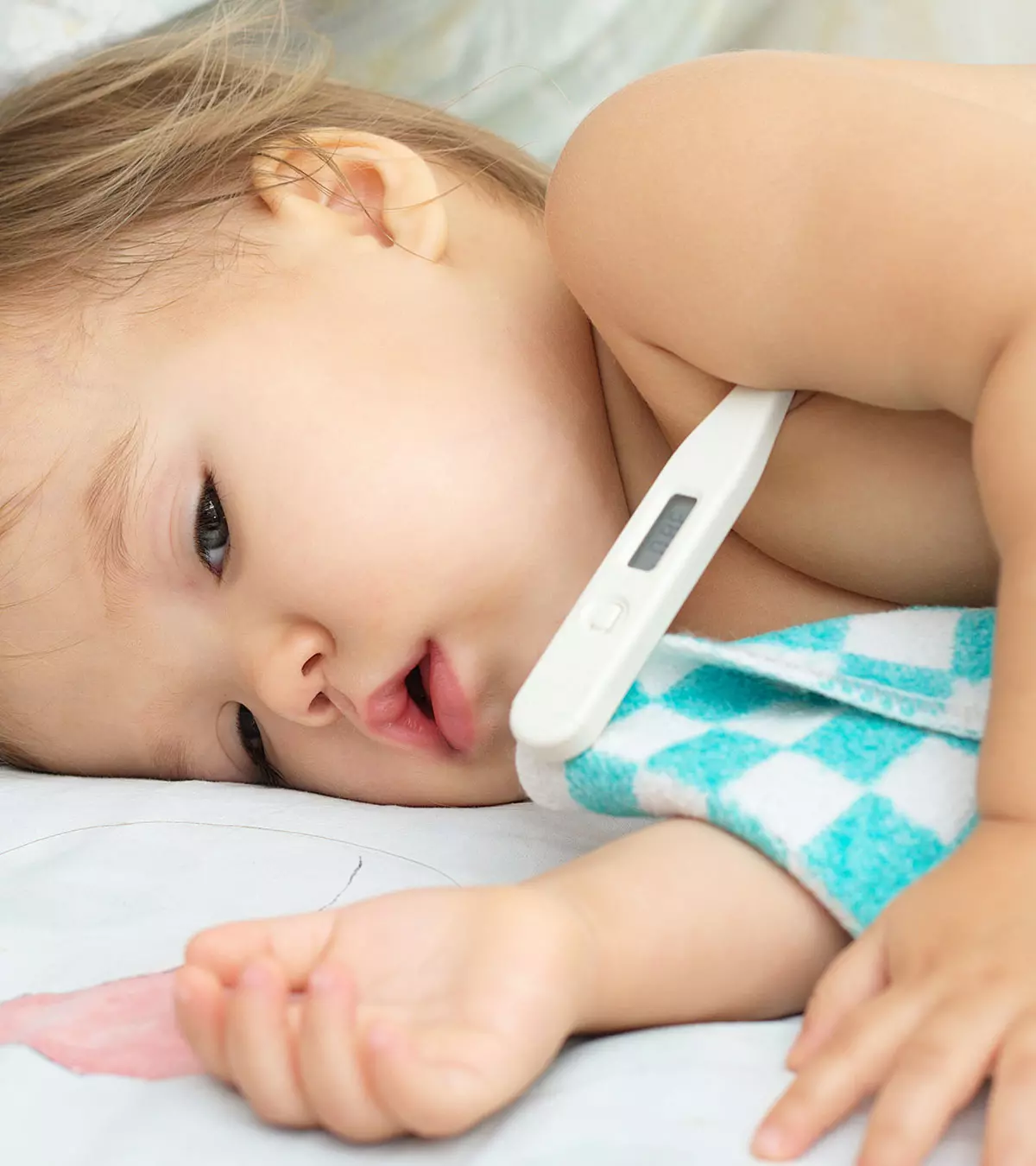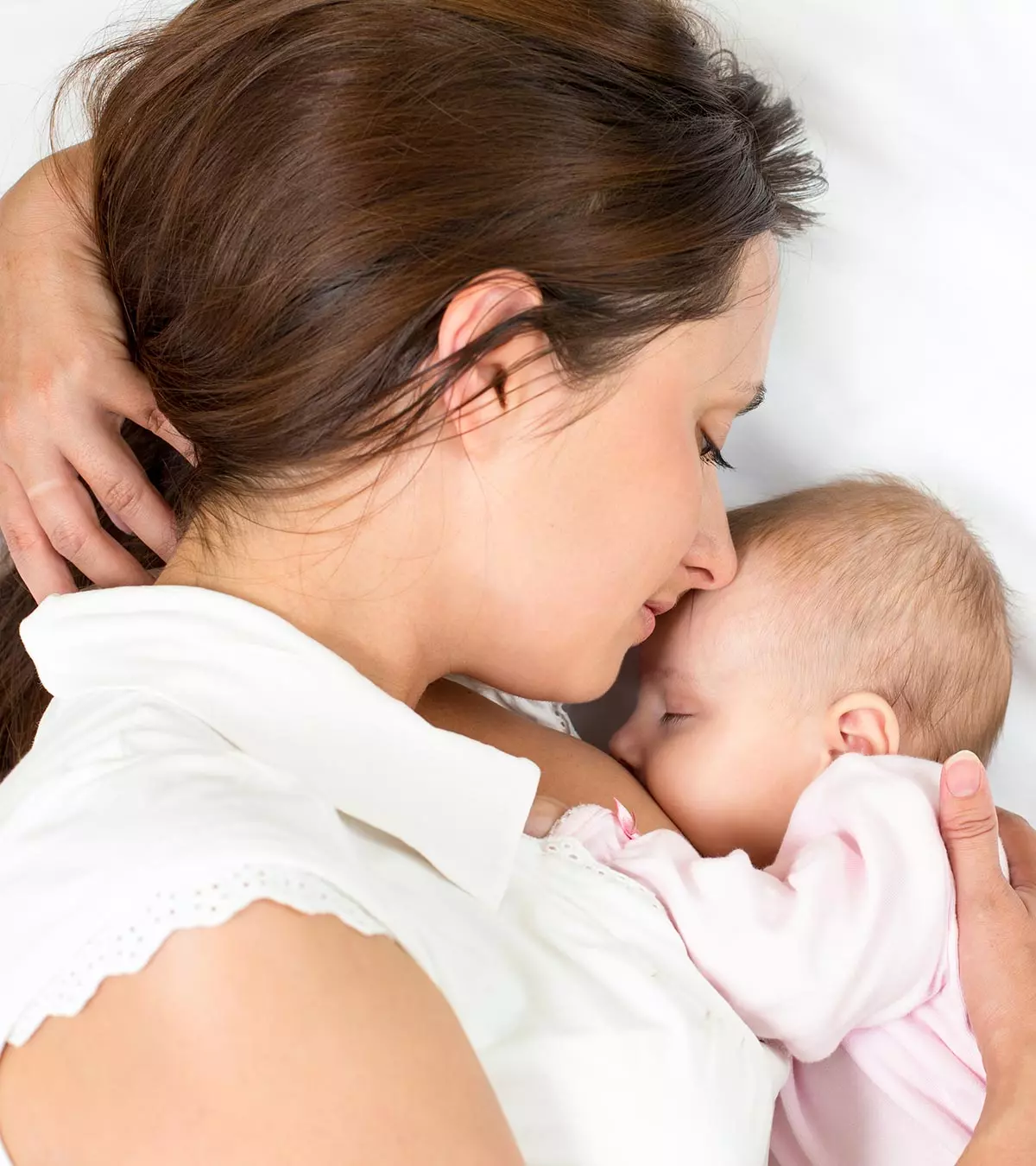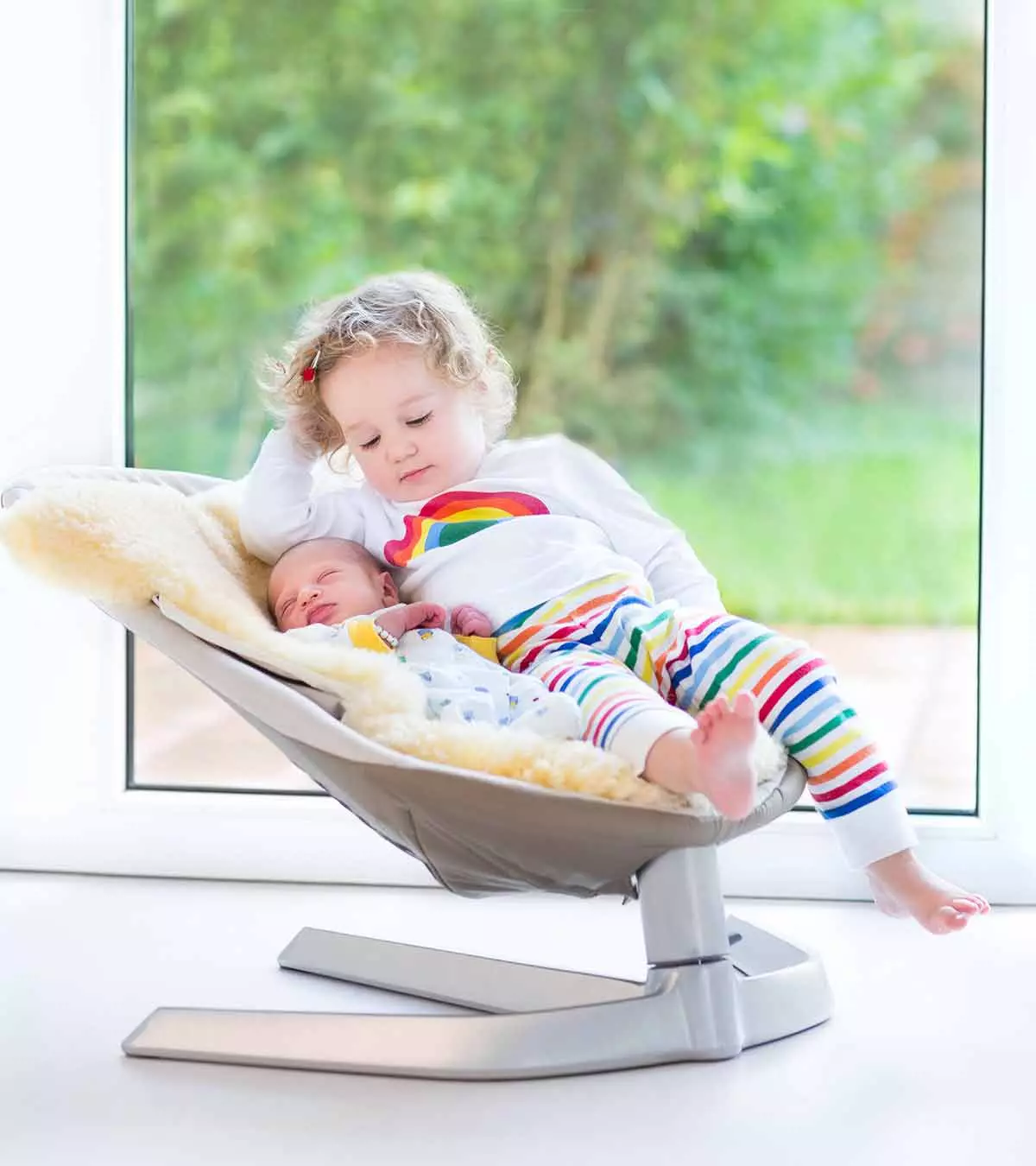

Image: Shutterstock

When you bring your newborn home, you will need to consider many factors, including where your baby will sleep. Because the infant is still young, you may consider putting their crib in your room. However, as your baby grows older, you may wonder when to move baby into their own room and what other adjustments and changes you should make while taking this step.
In this article, we discuss whether babies should sleep in a separate room from birth, when newborns should be allowed to sleep in their own room, and how to prepare them for the transition.
Can Babies Sleep In Their Own Room From Birth?
Babies should preferably sleep in a crib placed in their parents’ room. This is known as room-sharing. The American Academy of Pediatrics recommends that babies room-share for the first six months and preferably up to 12 months (1). Experts state room-sharing during the first year of the baby’s life could reduce the risk of sudden infant death syndrome (SIDS) by 50%. It also makes it easier to feed the baby since they require frequent feeding during early infancy. Therefore, it is best to place the baby’s crib in your room, at least for the first year.
How To Tell A Baby Can Sleep In Their Own Room?
There is no specific way to tell if your one-year-old is ready to sleep alone. You may consult a pediatrician before moving the baby into their own room.
Below are some factors to consider before deciding if the baby is ready to sleep in their own room.
- Baby’s health
- Presence of chronic medical conditions
- Baby is on medication
You may have to wait longer for babies with certain medication conditions or anomalies. It is usually not advisable to move the baby to a new room when they are ill or are on some medication. Discuss the possible suitable time to transition the little one to their own room with a pediatrician.
Tips For Transitioning The Baby To Own Room
Once you are certain that it is time to move the baby to their own, you could consider the following points to make the transition easier.
- Choose the best time: Pick a time when it is most likely to be easy for you to move the baby to their own room. Do not pick phases when your baby is experiencing new changes, such as the arrival of a sibling or moving to a new home, making the baby clingy and in need of constant reassurances from parents. Help the baby learn to distinguish night from day. For example, as naps get shorter, letting the baby nap wherever they are, but at night place them in their room so they are less disturbed by others and can sleep for longer and eventually all through the night.
- Introduce the baby to their room: Let the baby spend a substantial number of their waking hours in their new room. Place the baby’s toys in the room and let them always play in it. It will help acquaint the baby with the room and make them comfortable with it.
- Set a safe sleep environment: Make the baby’s room safe and comfortable for sleep. Dress your baby appropriately for the season. If it is cold, dress the baby in onesies, and if it is warm, you may dress the baby in soft, single-layered clothes. Maintain a room temperature of 65 to 70°F (18 to 21°C), which is ideal for babies (2). These measures will ensure that the baby will sleep through the night alone without waking up.
- Start with naps: Begin by placing the baby in their room for naps. Once your baby is sleeping through naps for some weeks, place them in their room for nighttime sleep. It could help your baby learn to sleep alone gradually.
- Establish a routine: Place the baby exactly at the same time for their naps and nighttime sleep to establish a bedtime routine. It will make the routine predictable for the little one, and they will know when it is time for them to sleep alone in their own room. You can incorporate comforting bedtime routine actions, such as giving a bath, feeding them, and reading a story, before placing them in their crib for nighttime sleep.
- Check the baby initially: You may set specific intervals and times to check the baby in their room during the initial phase of the transition. It will help you know if the baby is getting along with sleeping in their own room. Keep your visits discreet to avoid disturbing the baby.
- Consider aids and devices: You may take the help of baby monitors or baby room cameras that let you check on the baby from your room. Many devices connect to smartphones and alert the parent when the baby wakes up or tries to move out of the crib. Baby-monitoring devices could be especially useful if your baby has a tendency to wake up in the middle of the night or is unwell.
Frequently Asked Questions
1. Do babies sleep better in their own rooms?
Research finds that babies sleep better in their rooms after four months. Infants may have a longer uninterrupted sleep lasting nine hours when they are alone in the room. They may get a little shorter or less sleep lasting 8.3 hours at night while sleeping in the same room with parents after four months (3).
2. When should I move my baby to their room?
It is important to ensure that babies are getting enough sleep and sleeping safely simultaneously. According to the American Academy of Pediatrics (AAP), infants should share a room with their parents, not the bed, for a year of life, or at least six months. This reduces the risk of sudden infant death syndrome (SIDS) (3).
3. Can babies sense mom in the room?
Babies can sense the presence of their mom in the room through scents. They can also recognize their favorite toy or object through specific scents at a young age. Various studies have shown the ability of newborns to recognize their mother’s body odor and breast milk even during the initial days of life (4).
4. How long does it take for a baby to get used to their room?
The whole process of sleeping in the room without any tantrums can take a few weeks. This is not a quick fix process. Some babies can adjust to their room easier, while a few may take longer (5).
5. How do I prepare my baby for their room?
You should be gentle, comforting, and constantly working on it for a few days of the week until they can fall asleep in their room. Following a regular bedtime routine and spending time in their room may gradually help the baby get used to the new environment (6).
The ability to sleep in a separate room is a major milestone for babies and an achievement for the parents as well. The presence or absence of medical conditions determines when to move your baby into their own room. Babies should share their parents’ room for around a year or more if they are sick or on medications. Transition the baby when they are not affected by other stress-inducing factors and allow them to get comfortable in their room when awake. Start with small naps and then proceed to a nighttime schedule. You could also set up a monitoring device to ensure their safety.
Infographic: Baby’s Safety In Their Bedroom
You may worry about your baby’s safety while transitioning them to a new bedroom. However, peeking or visiting their room frequently could delay a successful transition. Here is an infographic that discusses babyproofing the room and tips for choosing the right baby monitor. These measures can help you keep your baby safe once they have transitioned to sleeping in their rooms.
Some thing wrong with infographic shortcode. please verify shortcode syntax
Key Pointers
- The American Academy of Pediatrics says that babies should share the room with their parents in the first year.
- To successfully transition the baby into their new room, introduce them to their room and aim at making them comfortable there.
- Aim for a slow transition and choose the time wisely.
- Invest in safety equipment and check on them frequently in the initial days.
References
- How to Keep Your Sleeping Baby Safe: AAP Policy Explained; American Academy of Pediatrics
https://www.healthychildren.org/English/ages-stages/baby/sleep/Pages/A-Parents-Guide-to-Safe-Sleep.aspx - What Is the Ideal Sleeping Temperature for My Bedroom?; Cleveland Clinic
https://health.clevelandclinic.org/what-is-the-ideal-sleeping-temperature-for-my-bedroom - Babies Sleep Better In Their Own Rooms After 4 Months Study Finds.
https://www.npr.org/sections/health-shots/2017/06/05/531582634/babies-sleep-better-in-their-own-rooms-after-4-months-study-finds#:~:text=The%20AAP%20recommends%20infants%20share - Why Baby’s Sense of Smell is Important.
https://pathways.org/babys-sense-of-smell - Moving your Baby out of your Room.
https://www.childcare.co.uk/information/moving-your-baby-out-of-your-room - When Is My Child Ready to Sleep In Their Own Room?.
https://www.zerotothree.org/resources/336-when-is-my-child-ready-to-sleep-in-their-own-room
Community Experiences
Join the conversation and become a part of our nurturing community! Share your stories, experiences, and insights to connect with fellow parents.
Read full bio of Kay Lakka
Read full bio of Shivali Karande















